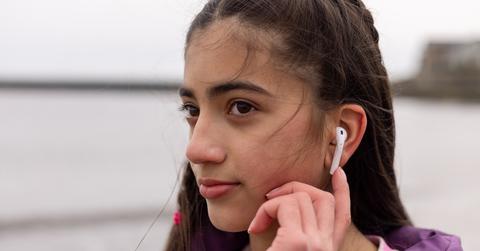Your AirPods Could Be Giving You Hearing Loss — Here’s How to Prevent It
Dec. 13 2023, Published 3:13 p.m. ET

The Gist:
AirPods can damage your hearing if you listen for too long, or at loud volumes.
Physicians warn that more teens will face hearing loss in the future than ever before, but there are ways to prevent it.
Some claim that the Bluetooth technology of AirPods can cause cancer, but this has been debunked.
When AirPods first hit the shelves in 2016, it was the sudden death of wire headphones as we know it. AirPods offer a tangle-free listening session, and being nearly invisible, they are not only covert but sleek. But it’s really all thanks to one thing: Bluetooth.
However, not everyone is on board with Bluetooth headphones. Shortly after AirPod's release, there was a floating rumor that AirPods could give you cancer because Bluetooth uses radiation, but there was no evidence to prove this. What is true, unfortunately, is that AirPods can damage your hearing and lead to hearing loss. It's a sad question but are AirPods bad for you?

Are AirPods bad for you?
AirPods and other earbud headphones could be bad for your hearing, depending on how much you use them. According to the American Osteopathic Association (AOA), 20 percent of teens today will experience hearing loss, which is an increase of 30 percent over 20 years, likely from using headphones.
Listening too long or too high of a volume is a major factor in hearing loss. The AOA says that listening to sounds reaching 120 decibels (the volume of an emergency vehicle or rock concert) can cause hearing damage in just an hour and 15 minutes.
James E. Foy, DO, an osteopathic pediatrician from Vallejo, California, told the AOA, “As a rule of thumb, you should only use MP3 devices at levels up to 60 percent of maximum volume for a total of 60 minutes a day. The louder the volume, the shorter your duration should be. At maximum volume, you should listen for only about five minutes a day.”
Another thing to know when using headphones is that the ear canal is very delicate, and when blocked by a headphone all the time, it can become infected. This can lead to frequent ear infections, especially if the earbuds are not cleaned regularly, per Mana Medical Associates.

How do you check if your AirPods are too loud?
So, you may wonder how to know the decibel of your AirPods. If you have an iPhone, it’s quite easy. While listening to music, open the Settings app on your iPhone, scroll down to select “Control Center,” and add the “Hearing” control. It should look like a blue box with an ear in it. Now, when you swipe to reach the control center on your iPhone screen, you should see an ear icon towards the bottom, which you can click to see your current decibel level, per Soundly.

Why do people think AirPods can cause cancer?
When Apple first released AirPods, a post online claimed that AirPods are dangerous because they release five times more radiation than over-the-ear headphones. According to USA Today, this has since been debunked. The radiation released by AirPods is well under the Federal Communications Commission (FCC) radiofrequency exposure limit, which is already set with a large safety margin.
When people hear radiation, they often jump to cancer. However, there are different kinds of radiation, non-ionizing and ionizing. Ionizing radiation, which can be found in things like radioactive waste and X-rays, can damage your cells and cause cancer.
Non-ionizing radiation, which is the kind found in Bluetooth technology and AirPods, does not cause cancer. According to Health, some claim that more research still needs to be done on the effects of Bluetooth to confirm this.